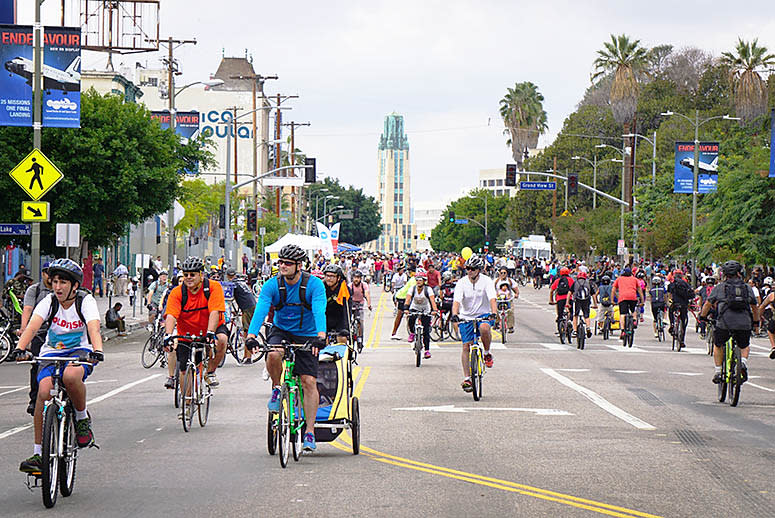Cities Are Banning Cars in Favor of Cyclists and Pedestrians to Fight Choking Pollution

It’s no secret that traffic contributes to poor air quality in urban centers, but it’s now clear that even just one car-free day, such as Los Angeles’ CicLAvia event, can significantly improve the quality of what you’re breathing.
Hosted by the nonprofit of the same name in partnership with Los Angeles County Metro and the mayor’s office, a CicLAvia is a one-day event in which streets in a neighborhood of Los Angeles are closed to traffic and opened for cyclists and pedestrians. The last CicLAvia to take place in Downtown Los Angeles was in October 2014; it cut particulate pollution in half compared with normal traffic days, according to a study from UCLA’s Fielding School of Public Health that was published in the journal Environmental Pollution. There was even a 12 percent drop in pollution in surrounding communities and streets that were still open to vehicles, researchers found.
The most recent CicLAvia took place Sunday in Downtown Los Angeles and East Los Angeles—neighborhoods home to some of the worst air quality in California. Since 2010, there have been 14 CicLAvia events, opening more than 100 miles of street.
“Los Angeles does not meet the EPA’s air quality goals, and traffic is a major source of the problem,” said Yifang Zhu, a professor at UCLA and the study’s principal investigator. “Not only does CicLAvia reduce the concentrations of traffic-emitted air pollutants, but we were also struck that the reduction of particulate pollution extends beyond the CicLAvia route.”
CicLAvia is derived from a similar event, Ciclovía, which originated in Bogota, Colombia, in 1974. Ciclovía (the word is Spanish for “bicycle pathway”) takes place every Sunday and some holidays and runs through the heart of the city. Each week more than 1 million people take to the opened streets.
Shi Shu, an investigator on the UCLA study, suggests that cities’ air quality and the overall wellness of the population would benefit from more open-street events.
“The reduction of air pollutant concentrations is especially beneficial to the large number of event participants who rode their bicycles along the route, because their respiration rates were much higher than that of the pedestrians,” he said. “CicLAvia events should be held more frequently in the future.”
As the trend catches on, more cities are experimenting with going car-free. In September, Paris banned all cars in four major districts surrounding major landmarks including the Eiffel Tower and the Champs-Élysées, a success that Paris Mayor Anne Hidalgo hopes to replicate with a totally car-free event in the city next year. The most polluted city in the world, New Delhi, will hold its first car-free day on Oct. 22, and on Monday the government of Oslo, Norway, announced plans to ban private cars completely from the city center by 2019.
Related stories on TakePart:
• For the Win: Star Cyclists of Africa Say More Bikes Equal More Kids in School
• Cutting Big-Truck Pollution Can Cut Costs for Everyone
• Thanks to This MIT Scientist, You Can Press Print Using Air Pollution
Original article from TakePart

